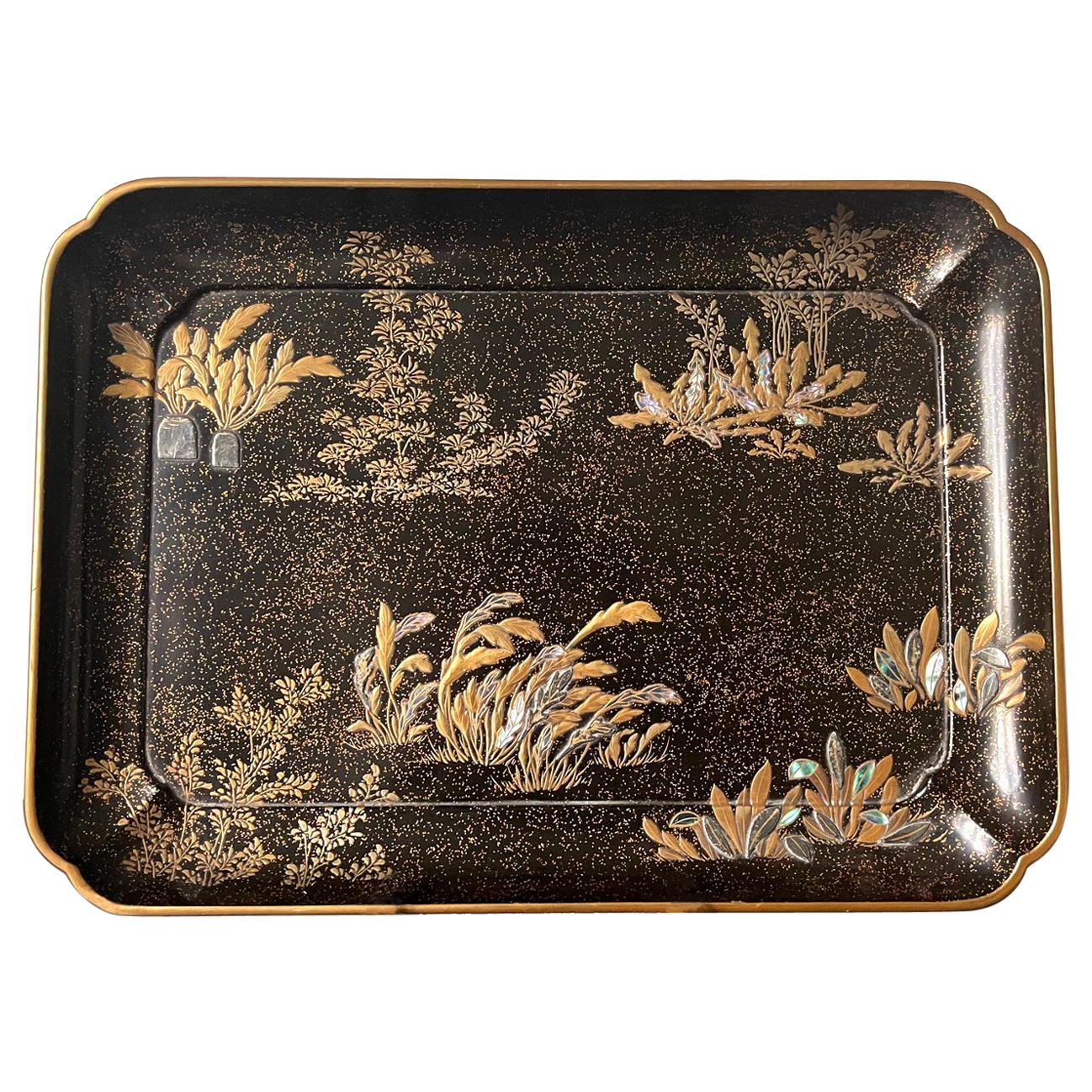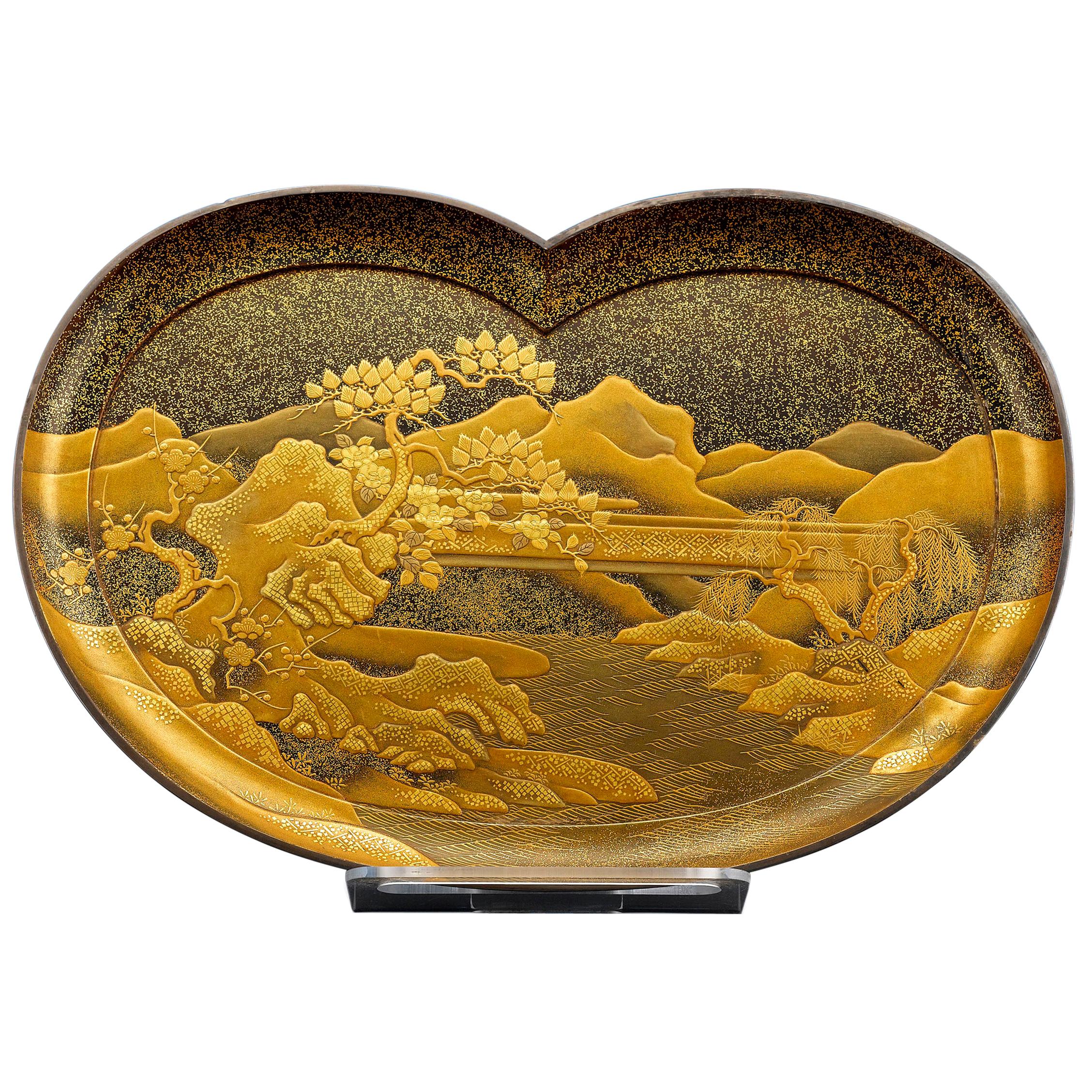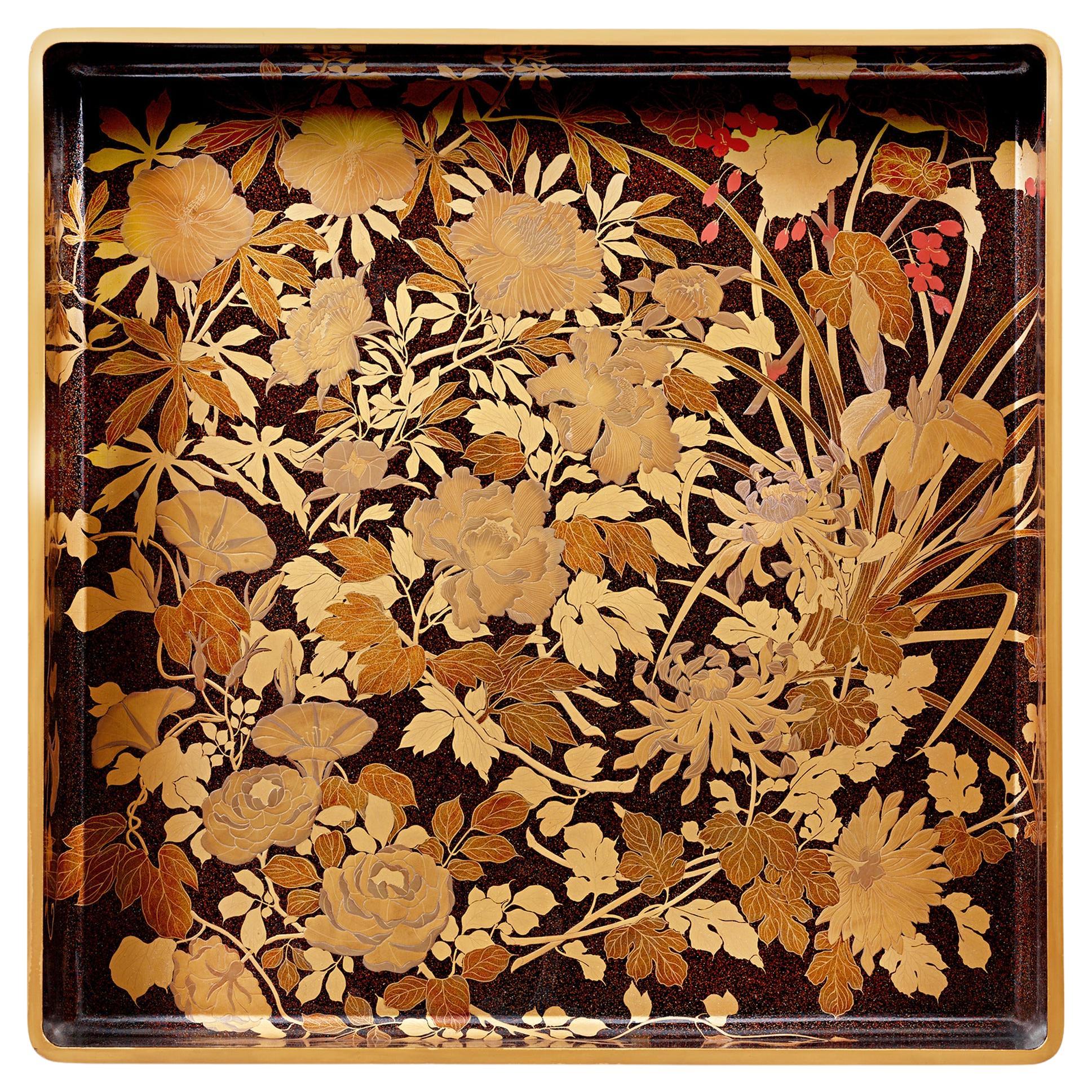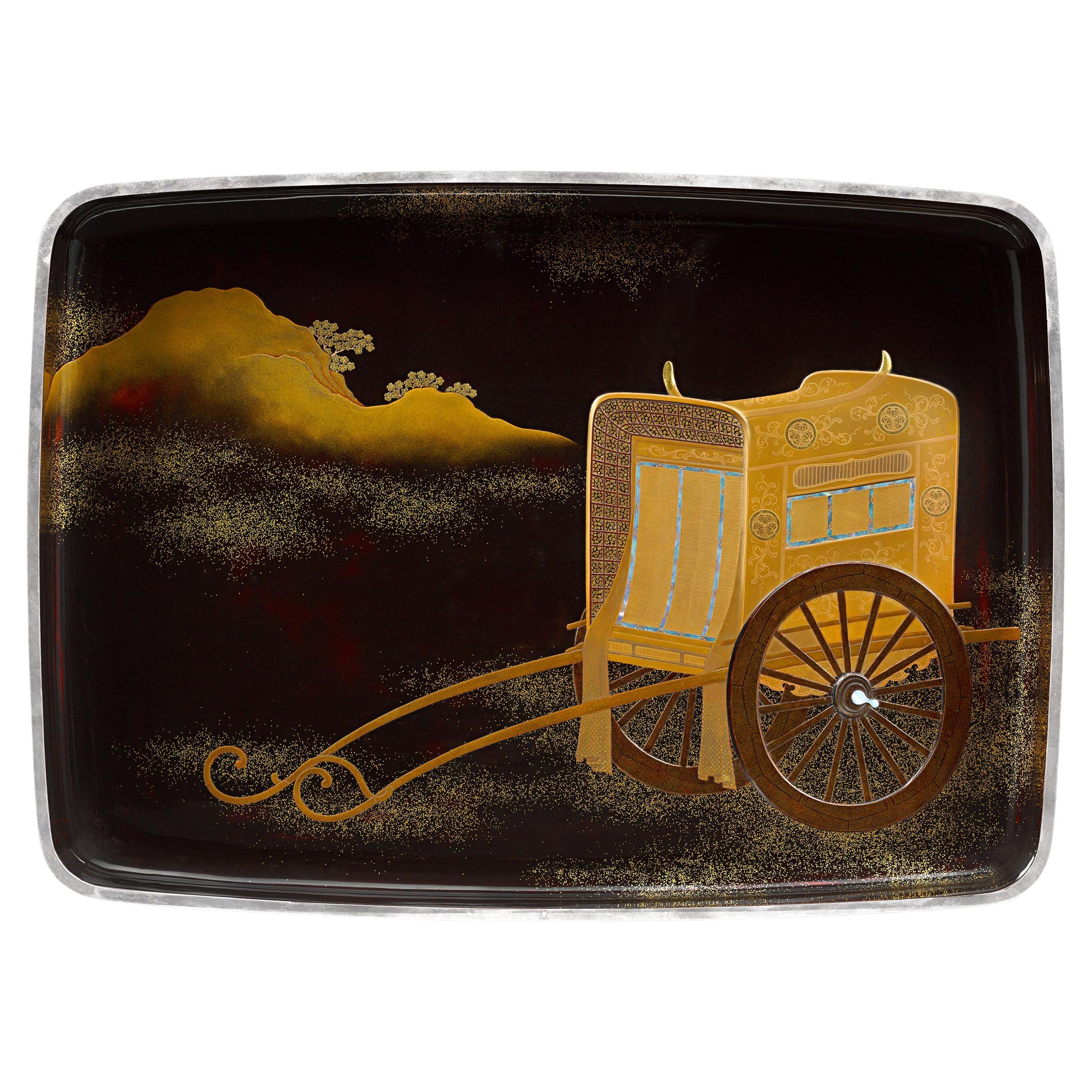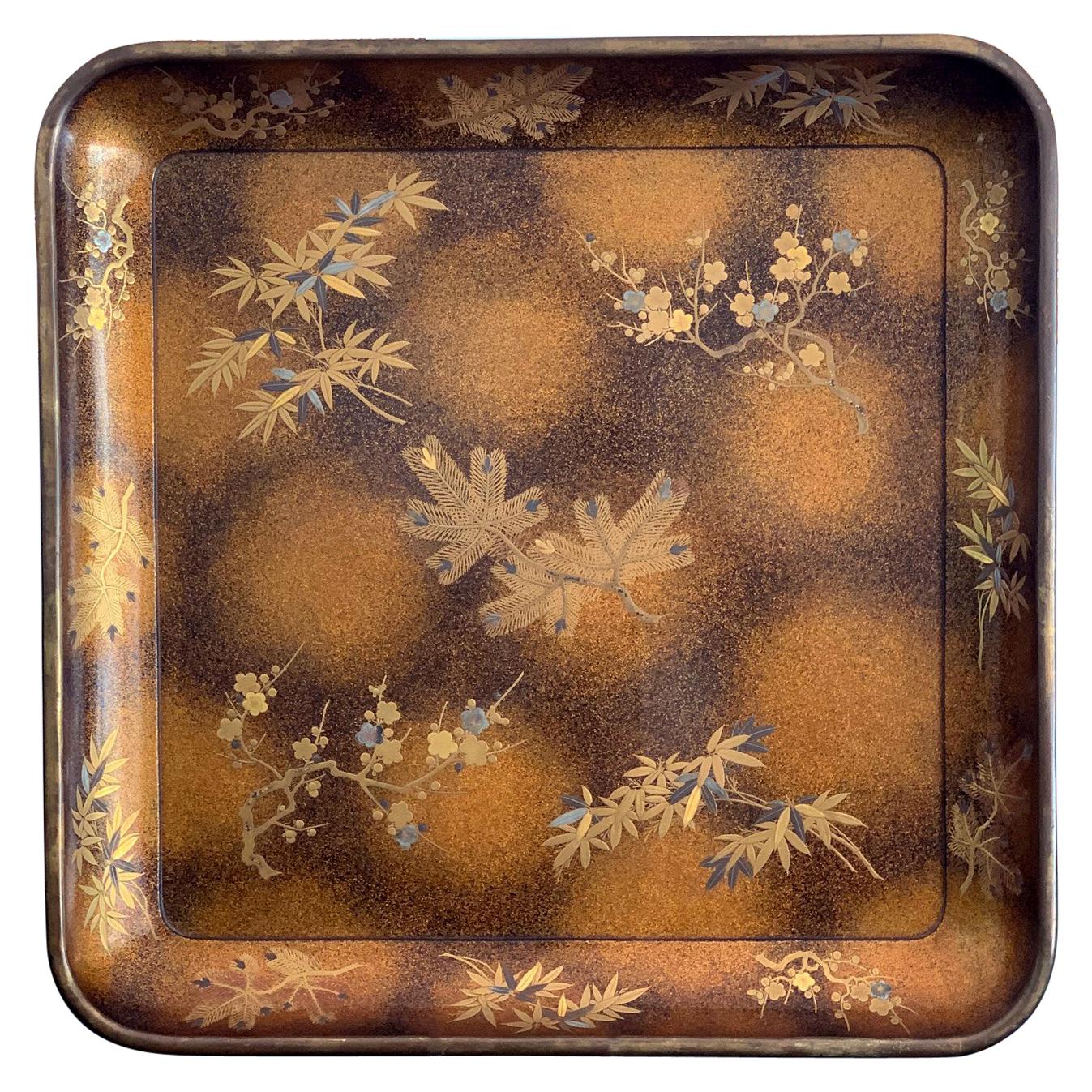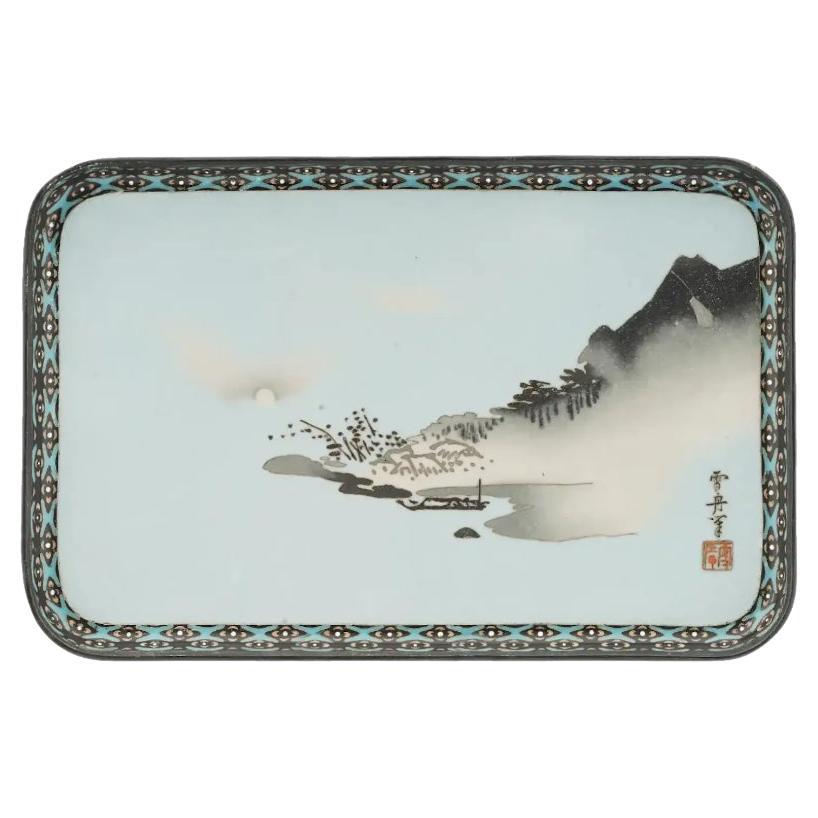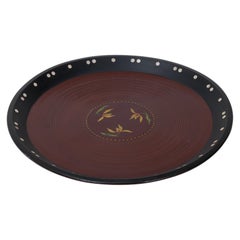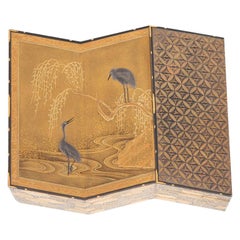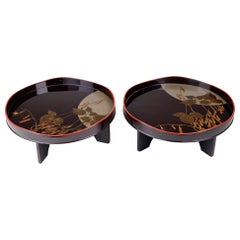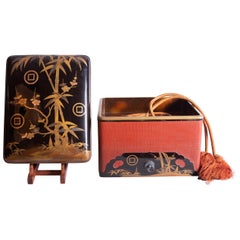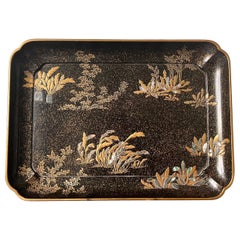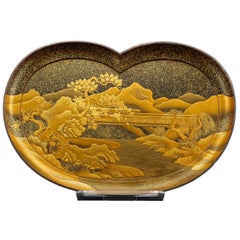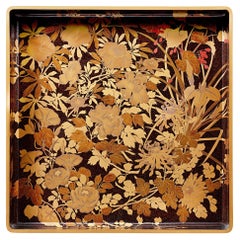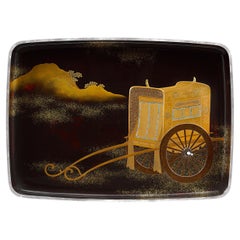Items Similar to Japanese Nashiji Lacquer Tray with Crane and Wave Design
Want more images or videos?
Request additional images or videos from the seller
1 of 8
Japanese Nashiji Lacquer Tray with Crane and Wave Design
$15,000
£11,326.62
€13,052.69
CA$21,171.38
A$23,340.96
CHF 12,211.24
MX$286,350.21
NOK 153,715.28
SEK 143,748.09
DKK 97,477.83
About the Item
Japanese Nashiji lacquer tray with crane and wave design, this exquisite tray is a masterful example of multiple lacquer techniques using gold (including maki-e and takamaki-e). This special tray was originally used as an offering tray, to offer a robe or a kimono to an aristocrat (or possibly an actor). Wonderful detail in the feathers of the crane, and the crashing waves. Comes with its original storage box.
- Dimensions:Height: 24 in (60.96 cm)Width: 24 in (60.96 cm)Depth: 4 in (10.16 cm)
- Style:Meiji (Of the Period)
- Materials and Techniques:
- Place of Origin:
- Period:
- Date of Manufacture:1870s-1880s
- Condition:Most items that are 100 years old have been cleaned or polished in their lifetime. More involved restorations are mentioned in the above description. For a detailed condition report and a video of this item please contact us directly. -Naga Antiques.
- Seller Location:Hudson, NY
- Reference Number:Seller: A43001stDibs: LU855120534032
About the Seller
5.0
Recognized Seller
These prestigious sellers are industry leaders and represent the highest echelon for item quality and design.
Established in 1971
1stDibs seller since 2008
166 sales on 1stDibs
Typical response time: 8 hours
Associations
The Art and Antique Dealers League of AmericaAntiques Associations Members
- ShippingRetrieving quote...Shipping from: Craryville, NY
- Return Policy
Authenticity Guarantee
In the unlikely event there’s an issue with an item’s authenticity, contact us within 1 year for a full refund. DetailsMoney-Back Guarantee
If your item is not as described, is damaged in transit, or does not arrive, contact us within 7 days for a full refund. Details24-Hour Cancellation
You have a 24-hour grace period in which to reconsider your purchase, with no questions asked.Vetted Professional Sellers
Our world-class sellers must adhere to strict standards for service and quality, maintaining the integrity of our listings.Price-Match Guarantee
If you find that a seller listed the same item for a lower price elsewhere, we’ll match it.Trusted Global Delivery
Our best-in-class carrier network provides specialized shipping options worldwide, including custom delivery.More From This Seller
View AllJapanese Lacquer Tray with Intricate Designs
Located in Hudson, NY
This lacquer tray uses several lacquer techniques including multi-color painting of flowers, ito-me (thread pattern) and shell inlay. The artist was Shimano Sanshu (1877 - 1965). He ...
Category
Early 20th Century Japanese Showa Lacquer
Materials
Lacquer
Fine Lacquer Kogo 'Incense Box'
Located in Hudson, NY
Exquisitely detailed incense storage box in gold lacquer with silver and gold overlays of a folded screen with heron and willow design. Flowers and...
Category
Antique Late 19th Century Japanese Meiji Lacquer
Materials
Lacquer
Pair of Antique Japanese Lacquer Trays
Located in Hudson, NY
Pair of antique Japanese Lacquer Trays, Taisho period (1912-1926) beautifully decorated with a miniature landscape of pea pods on the vine and a gold cricket set...
Category
Vintage 1920s Japanese Taisho Lacquer
Materials
Lacquer
$2,500 / set
Japanese Lacquer Box with Bamboo, Plum, and Family Crest
Located in Hudson, NY
Made with heavy gold flakes and lacquered fabric on wood, with cutout heart designs. Has an interior tray, and comes with silk tasseled ties. (Does not come with presentation stand).
Category
Antique 19th Century Japanese Lacquer
Materials
Lacquer
Japanese Lacquer Kogo 'Incense Box'
Located in Hudson, NY
Late Edo (1614 - 1868) period incense storage box in stacked, double fan design. Fans have bamboo and plum design with a chrysanthemum crest. Silve...
Category
Antique Mid-19th Century Japanese Edo Lacquer
Materials
Gold
Japanese Two-Panel Screen: Cranes on Gold
Located in Hudson, NY
Early Kano School painting of pine trees overlooking two beautifully painted cranes and floral design in a natural setting by water’s edge. Mineral pig...
Category
Antique Late 18th Century Japanese Paintings and Screens
Materials
Gold, Gold Leaf
You May Also Like
Japanese Lacquer Tray with Maki-e and Inlay Hara Yoyusai Edo Period
Located in Atlanta, GA
A lovely Japanese lacquer rectangular lacquer tray with a slightly scalloped corner and four L shape supporting feet by one of the most celebrated lacquer artist active in Edo period Hara Yoyusai (1772-1845). Yoyusai lived in Edo (Tokyo) and worked under the patronage of Lord Matsudaira. He operated a large workshop and had a very prolific output of lacquer objects. Most survived pieces being inro...
Category
Antique 19th Century Japanese Japonisme Lacquer
Materials
Wood, Lacquer
Japanese Lacquer Tray
Located in New Orleans, LA
As beautiful as it is practical, this Japanese Meiji-period lacquered tray is distinguished by its exceptional craftsmanship. It exhibits a phenomenal artistry as the entire tray is ...
Category
Early 20th Century Japanese Meiji Lacquer
Materials
Lacquer
$8,850
Japanese Lacquer and Gold Tray
Located in New Orleans, LA
This Meiji-period lacquer tray represents the mastery of Japanese craftsmen in the art of lacquer work. Precious materials are precisely inlaid in the lacquer base, creating a highly...
Category
Antique Late 19th Century Asian Meiji Lacquer
Materials
Gold
Japanese Lacquer Tray
Located in New Orleans, LA
Hailing from illustrious Meiji-period Japan, this lacquer tray showcases the mastery of Japanese craftsmen. Precious materials are precisely inlaid in the lacquer base, creating an a...
Category
Antique Late 19th Century Japanese Meiji Lacquer
Materials
Silver
$19,800
Large Vintage Japanese Maki-e Lacquer Kimono Tray
Located in Atlanta, GA
A large square lacquer presentation tray (likely for kimono) predated 1950 of the Showa period. Elaborately decorated with Maki-e that depicts the prunus blossom, bamboo and needle p...
Category
Vintage 1940s Japanese Japonisme Lacquer
Materials
Wood, Lacquer
Japanese Wireless Cloisonné Serving Tray Meiji After Namikawa Sosuke
Located in Long Island City, NY
A rare 19th Century Japanese copper serving tray with cloisonne enamel design. The central part of the tray depicts a wireless cloisonne picture, a coastal landscape view with a full moon. The hieroglyphical signature of the artist is in the lower right. The rims and the backside are decorated with floral ornaments. Blue and black color palette. Collectible Oriental Decor And Applied Arts For Interior Design.
Namikawa Sosuke (1847–1910) was a Japanese cloisonné artist,[1] known for innovations that developed cloisonné enamel into an artistic medium sharing many features with paintings.[2][3] He and Namikawa Yasuyuki (no relation)[notes 1] were the most famous cloisonné artists of the 1890 to 1910 period, known as the "golden age" of Japanese enamels.[1] Around 1880 he set up and ran the Tokyo branch of the Nagoya Cloisonné Company.[1] He exhibited his artworks at national and international expositions, where he took an organising role.[2] He was recognised as an Imperial Household Artist and created art works for imperial residences. He sometimes signed his works with the character sakigake (Pioneer)
the art work is based off a art work done by Sesshu Toyo
Sesshu Toyo (?? ??, c. 1420 – August 26, 1506), also known simply as Sesshu (??), was a Japanese Zen monk and painter who is considered a great master of Japanese ink painting. Initially inspired by Chinese landscapes, Sesshu's work holds a distinctively Japanese style that reflects Zen Buddhist aesthetics.[1] His prominent work captured images of landscapes, portraits, and birds and flowers paintings, infused with Zen Buddhist beliefs, flattened perspective, and emphatic lines.[2]
Sesshu was born into the samurai Oda family (???) and trained at Shokoku-ji temple in Kyoto, Japan, as a Zen monk.[1] From his early childhood, Sesshu showed a talent for painting and eventually became widely revered throughout Japan as a wise, reputable Zen scholar, and the greatest painter priest of Zen-Shu.[3]
Sesshu worked in a painting atelier whilst training under Tensho Shubun (c. 1418–1463). But upon visiting China, his work betook a distinctive Chinese influence, merging Japanese and Chinese styles to develop his individualistic style of Zen paintings.[3] Sesshu's influence on painting was so wide that many schools of art appointed him their founder.[4] Sesshu's most acclaimed works are Winter Landscape (c. 1470s), Birds and Flowers (1420–1506) and Four Landscape Scrolls...
Category
Antique Late 19th Century Japanese Metalwork
Materials
Copper, Enamel
More Ways To Browse
Japanese Lacquered Art
Japanese 19th Century Lacquer
Antique Crane
Japanese Lacquer Meiji
Japanese Crane
Gold Cranes
Japanese Crane Art
Japanese Art Of Cranes
Kimono Gold Japanese
Japanese Gold Lacquer Box
Tray Japan
Meiji Cranes
Japanese Lacquered Tray
Gold Crane Japanese
Gold Lacquer Tray
Maki E
Asian Cranes
Meiji Lacquer Box
